Mucosal healing - Study guides, Class notes & Summaries
Looking for the best study guides, study notes and summaries about Mucosal healing? On this page you'll find 1301 study documents about Mucosal healing.
Page 2 out of 1.301 results
Sort by
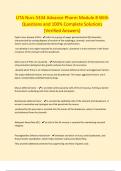
-
UTA Nurs 5334 Advance Pharm Module 8 With Questions and 100% Complete Solutions (Verified Answers)
- Exam (elaborations) • 26 pages • 2024
-
- $13.99
- + learn more
Peptic ulcer disease (PUD) - refers to a group of upper gastrointestinal (GI) disorders characterized by varying degrees of erosion of the esophagus, stomach, and small intestine. Severe ulcers can be complicated by hemorrhage and perforation. can develop in any region exposed to acid and pepsin, ulceration is most common in the lesser curvature of the stomach and the duodenum. Most cases of PUD are caused by - Helicobacter pylori and eradication of this bacterium not only promotes healing...
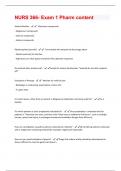
-
NURS 366- Exam 1 Pharm content Questions & Answers Rated 100% Correct
- Exam (elaborations) • 20 pages • 2024
-
- $7.99
- + learn more
Antacid families - - Aluminum compounds - Magnesium compounds - Calcium compounds - Sodium compounds Diphenoxylate (Lomotil) - - Formulated with atropine to discourage abuse - Opioid used only for diarrhea - High doses can elicit typical morphine-like subjective responses Do antacids alter systemic pH? - Except for sodium bicarbonate, *antacids do not alter systemic pH* Evaluation of therapy - - Monitor for relief of pain - Radiologic or endoscopic examination of ulcer site - H. pylor...
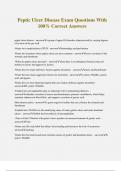
-
Peptic Ulcer Disease Exam Questions With 100% Correct Answers
- Exam (elaborations) • 8 pages • 2024
-
- $11.49
- + learn more
Peptic Ulcer Disease Exam Questions With 100% Correct Answers peptic ulcer disease - answera group of upper GI disorders characterized by varying degrees of erosion of the gut wall •Name two complications of PUD - answerhemorrhage and perforation •Name two locations where peptic ulcers are most common - answerlesser curvature of the stomach and duodenum •When do peptic ulcers develop? - answerwhen there is an imbalance between mucosal defensive factors and aggressive factors. •N...
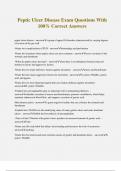
-
Peptic Ulcer Disease Exam Questions With 100% Correct Answers
- Exam (elaborations) • 8 pages • 2024
-
- $11.49
- + learn more
Peptic Ulcer Disease Exam Questions With 100% Correct Answers peptic ulcer disease - answera group of upper GI disorders characterized by varying degrees of erosion of the gut wall •Name two complications of PUD - answerhemorrhage and perforation •Name two locations where peptic ulcers are most common - answerlesser curvature of the stomach and duodenum •When do peptic ulcers develop? - answerwhen there is an imbalance between mucosal defensive factors and aggressive factors. •N...
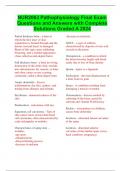
-
NUR2063 Pathophysiology Final Exam Questions and Answers with Complete Solutions Graded A 2024
- Exam (elaborations) • 18 pages • 2024
- Available in package deal
-
- $14.99
- + learn more
Partial thickness burn - a burn in which the first layer of skin (epidermis) is burned through and the dermis (second layer) is damaged. Burns of this type cause reddening, blistering, and a mottled appearence. (Also called second-degree burn). Full thickness burn - a burn involving destruction of the entire skin; extends into subcutaneous fat, muscle, or bone and often causes severe scarring; commonly called a third-degree burn Atopic dermatitis - Excess inflammation; dry skin, redness, a...
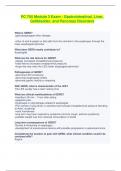
-
PC 705 Module 3 Exam - Gastrointestinal, Liver, Gallbladder, and Pancreas Disorders
- Exam (elaborations) • 22 pages • 2024
- Available in package deal
-
- $18.49
- + learn more
PC 705 Module 3 Exam - Gastrointestinal, Liver, Gallbladder, and Pancreas Disorders What is GERD? -gastroesophageal reflux disease -reflux of acid & pepsin or bile salts from the stomach to the esophagus through the lower esophageal sphincter What does GERD mostly contribute to? Esophagitis What are the risk factors for GERD? -obesity (increases intraabdominal pressure) -hiatal hernia (increases intrabdominal pressure) -drugs that may relax the LES (lower esophageal sphincter) Pathogenesis of ...
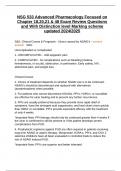
-
NSG 533 Advanced Pharmacology Focused on Chapter 18,20,21 & 48 Exam Review Questions With Distinction level Marking scheme updated 2024/2025
- Exam (elaborations) • 45 pages • 2024
-
- $12.49
- + learn more
NSG 533 Advanced Pharmacology Focused on Chapter 18,20,21 & 48 Exam Review Questions With Distinction level Marking scheme updated 2024/2025 S&S, Clinical Course & Prognosis - Ulcers caused by NSAID's - correct answer S&S: Uncomplicated vs complicated 1. UNCOMPLICATED - mild epigastric pain 2. COMPLICATED - GI complications such as bleeding (melena, hematemesis, or occult), obstruction, or perforation. Early satiety, N/V, abdominal pain, and weight loss. Clinical Course: 1. Choice...
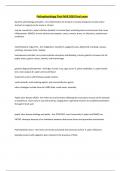
-
Pathophysiology Final NUR 2063 final exam
- Exam (elaborations) • 36 pages • 2023
- Available in package deal
-
- $15.99
- + learn more
Pathophysiology Final NUR 2063 final exam Gastritis and Etiology and patho - Ans-inflammation of stomach's mucolas lining (can involve entire stomach or region) can be acute or chronic. may be caused by h. pylori infection (imbeds in mucosal layer activating toxins and enzymes that cause inflammation. NSAIDS, chronic alcohol consumption, stress, trauma, burns, or infections, autoimmune conditions manifestations of gastritis - Ans-indigestion, heartburn, epigastric pain, abdominal cramp...
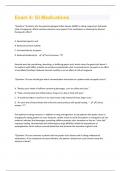
-
Exam 4: GI Medications (Questions + Answers) Solved
- Exam (elaborations) • 12 pages • 2024
- Available in package deal
-
- $7.99
- + learn more
*Question:*A patient who has gastroesophageal reflux disease (GERD) is taking magnesium hydroxide (milk of magnesia). Which outcome should a nurse expect if the medication is achieving the desired therapeutic effect? A. Neutralized gastric acid B. Reduced stomach motility C. Increased barrier to pepsin D. Reduced duodenal pH - Correct answer: *A* Antacids work by neutralizing, absorbing, or buffering gastric acid, which raises the gastric pH above 5. For patients with GERD, antacids can ...
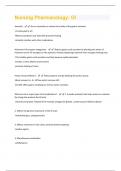
-
Nursing Pharmacology: GI Questions And Answers With Latest Updates
- Exam (elaborations) • 7 pages • 2024
- Available in package deal
-
- $8.19
- + learn more
Antacids - -Act to neutralize or reduce the acidity of the gastric contents -increase gastric pH -Relieves symptoms but does NOT promote healing -Antacids interfere with other medications Histamine H2-receptor antagonists - -Reduce gastric acid secretion by blocking the action of histamine at the H2 receptors in the stomach, thereby displacing histamine from receptor binding sites -This Inhibits gastric acid secretion and they become rapidly absorbed -Creates a more alkaline environment ...

How did he do that? By selling his study resources on Stuvia. Try it yourself! Discover all about earning on Stuvia


